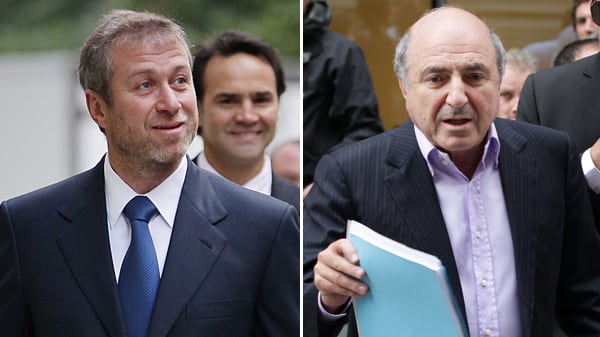It’s the heavyweight confrontation of the century: a legal grudge match with billions of dollars at stake. After a decade of sparring, the two biggest bruisers of Russia’s billionaire class—sworn enemies with similar reputations for high living—have at last come within punching distance.
In one corner of the court: the 44-year-old former plastic-duck salesman, engineer, and oil trader Roman Abramovich, an orphan from Siberia who managed to pile up a fortune now estimated at $16 billion in less than 10 years. His assets include the high-flying Chelsea Football Club, the world’s largest yacht, and a girlfriend who is a former model.
In the other: the Soviet-era mathematics professor Boris Berezovsky. The 65-year-old, once a hugely powerful Kremlin insider and media mogul, is now living in exile in England. He’s been a regular assassination target in the past—one attempt saw his driver decapitated—and his home is a fortified mansion in the countryside said to be guarded by a squad of former French Legionnaires.
The venue: courtroom 26 of the High Court in London, where the two adversaries are out to settle a vicious squabble dating back to the lawless epoch of post-communist Russia in the '90s, when both were involved in the murky dealings that accompanied the privatization of the country’s mineral wealth.

Betrayal adds spice to the contest. The two, who first reportedly met on a Caribbean cruise, were once firm friends and maybe business partners. By some accounts, it was Berezovsky who provided the political sponsorship and savvy needed for his protégé to make his billions, only to be cheated of his rightful share. The two have rarely come face to face in 10 years.
At issue is the older man’s claim for $5 billion in damages, a record for the British courts. Berezovsky says—there is no written documentation—that he was coerced by Abramovich into selling his 21 percent stake in the oil company Sibneft after he fled Russia in 2000 following a bust-up with the country’s then-president, Vladimir Putin.
Threatened that he would see his assets seized by the state, Berezovsky accepted just $1.3 billion for the shares—only a fraction of what he believed to be their true worth. In 2005, Sibneft was sold by an Abramovich company to the state-owned energy group Gazprom for a whopping $13 billion.
Don’t expect a clean fight. The case, which began yesterday, is expected to last at least two months, and the court will doubtless hear plenty of details of how fortunes were amassed in wild, Yeltsin-era Russia. This will be a serious embarrassment to the publicity-shy Abramovich—he fought to have the case thrown out—who still enjoys the Kremlin’s favor.
Already Berezovsky’s lawyers appear to have been seeking to smear his opponent’s name. In court, Abramovich was described by Berezovsky's lawyer as “a man to whom wealth and influence mattered more than friendship and loyalty,” who was quite ready to forsake his former mentor.
Not that Abramovich is pulling any punches. His team (both men are employing some of the top names in the English bar) alleges that Berezovsky was never a partner in Sibneft. Rather, according to Abramovich's lawyers, he was paid for services that were “basically criminal in nature,” including protection from Chechen gangsters.
What’s more, in the late '90s Abramovich’s companies were picking up the tabs for Berezovsky’s extravagant lifestyle as payment for his services as “political godfather,” according to lawyer Jonathan Sumption. “This was personal expenditure on a most exuberant scale: palaces in France, private yachts and aircraft, jewels for his girlfriend, valuable paintings," says Sumption.
So far, the two men have sat peaceably at either end of the court, ignoring each other and divided by a host of bodyguards and lawyers. But given the ill will, the authorities holding the ring are taking no chances. The building is said to have been screened for bombs and checked for protection from sniper attack. When oligarchs fall out, who knows when the knockout blow will come?






